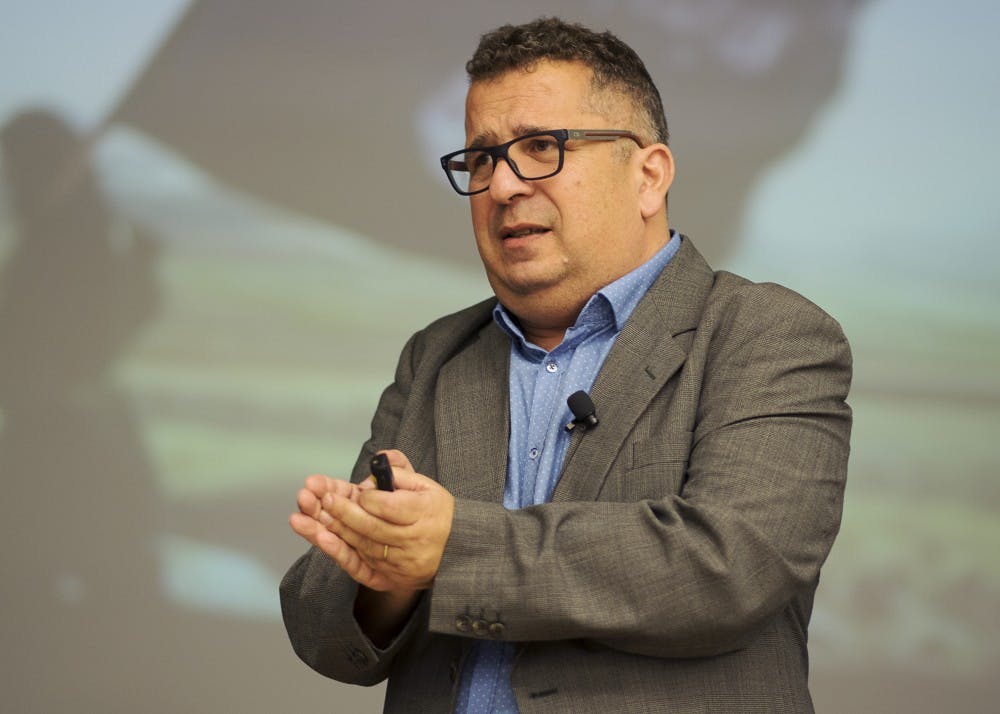The Middle East is a like sandwich with multiple layers that have roles in what happens to the region, Jewish educator and communications consultant Neil Lazarus said.
The sandwich is made up of three layers, the first being the three major outside influences in the Middle East: China, Russia and the United States. The second layer is non-state fundamentalists like ISIS, and the third is Israel and its neighbors.
The layers are not distinctly separate but coexist, Lazarus said.
“Don’t look where the borders are,” Lazarus said. “Look at where the people are because you are in a time when this map is going to change.”
Lazarus spoke about the Middle East crisis to around 75 people in a lecture, “Behind the Headlines,” Monday evening in the psychology building.The event was put on by the Helene G. Simon Hillel Center, the nonprofit Israel advocacy organization Stand With Us and the Zionist Organization of America.
Lazarus said ISIS is losing on the ground and that the only reason it still has power is because of social media. His main concern is what will fill the vacuum ISIS leaves behind, he said.
He believes the filler will be Hezbollah, a Lebanon-based Shi’a Islamist party and militant group. A war between Israel and Hezbollah is not a question of if but when, Lazarus said.
Lazarus also attempted to get the students to understand life in the Middle East. He showed a video clip of small children running inside and covering their heads as a siren went off.
Instead of their teachers explaining that the sirens meant missiles were coming, they made up a game instead.
“The teachers would tell the children, "When you hear a loud sirens go inside and pretend to be a Ninja Turtle,'” Lazarus said. “If you ask any Israeli in their twenties, they would say they remember pretending to be Ninja Turtles on the floor as children.”
In comparison, Americans in their twenties remember watching SpongeBob as a child, Lazarus said.
Lazarus pulled a student, who said his name was Nate, from the audience. He told the student he was a security officer and he would have to give him a prompt answer to a video he was about to show him.
Lazarus then showed the student a clip of two Palestinian gunmen climbing into an ambulance in Gaza and driving to the border of Israel to fire a rocket. After the clip ended, Lazarus turned to the student.
“Do you fire, yes or no?” Lazarus said. “I need an answer.”
“Yes,” Nate said.
“Are you sure?” Lazarus said. “What if there are kids in the ambulance?”
Nate hesitated and stumbled through an answer.
“I need an answer, yes or no,” Lazarus said, interrupting the student.
The student said yes because it would save others.
“There were four children on their way to a hospital in the ambulance,” Lazarus said.
Lazarus asked the student how old he was. He said he was 18.
“I want you to get it,” Lazarus said. “The people pressing the button are 18-year-olds in the Israeli army. It’s not the old guys. It’s you.”
Lazarus said he believes the root of the problem is in education. Lazarus shared a video from a Middle Eastern children’s TV program featuring a kid who wrote a poem about how he wants to kill all the Jews and free Israel.
Lazarus said he doesn’t expect channels to be showing reruns of Fiddler on the Roof, a popular Jewish musical, but rather the programs should teach children hope and not hate.
“At the end of the day, it’s about education,” Lazarus said. “If you want peace, you have to teach children peace.”




